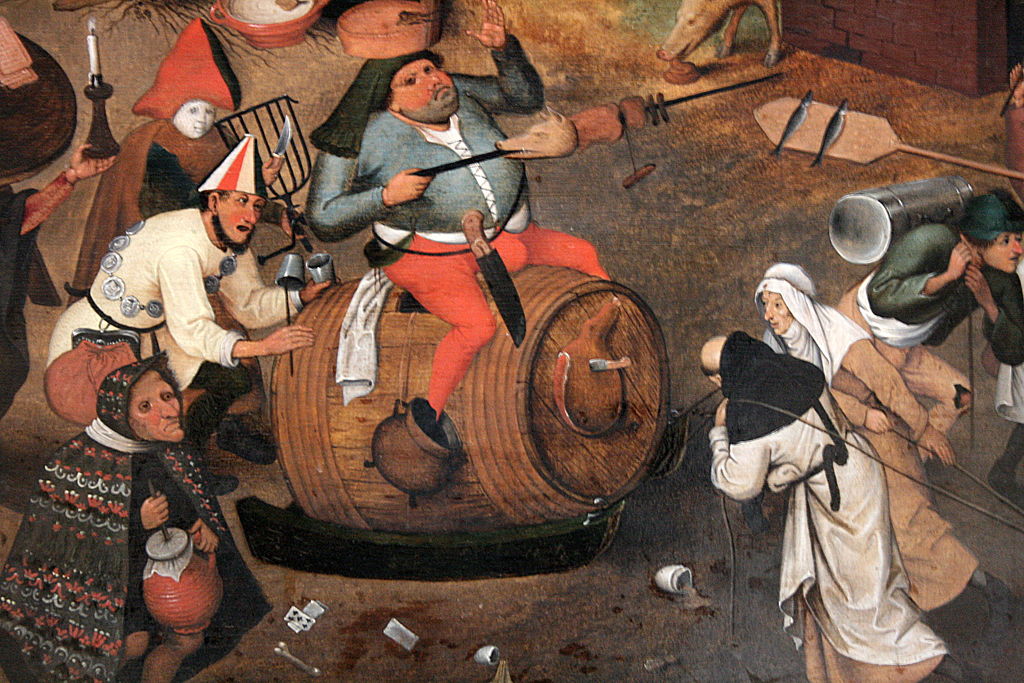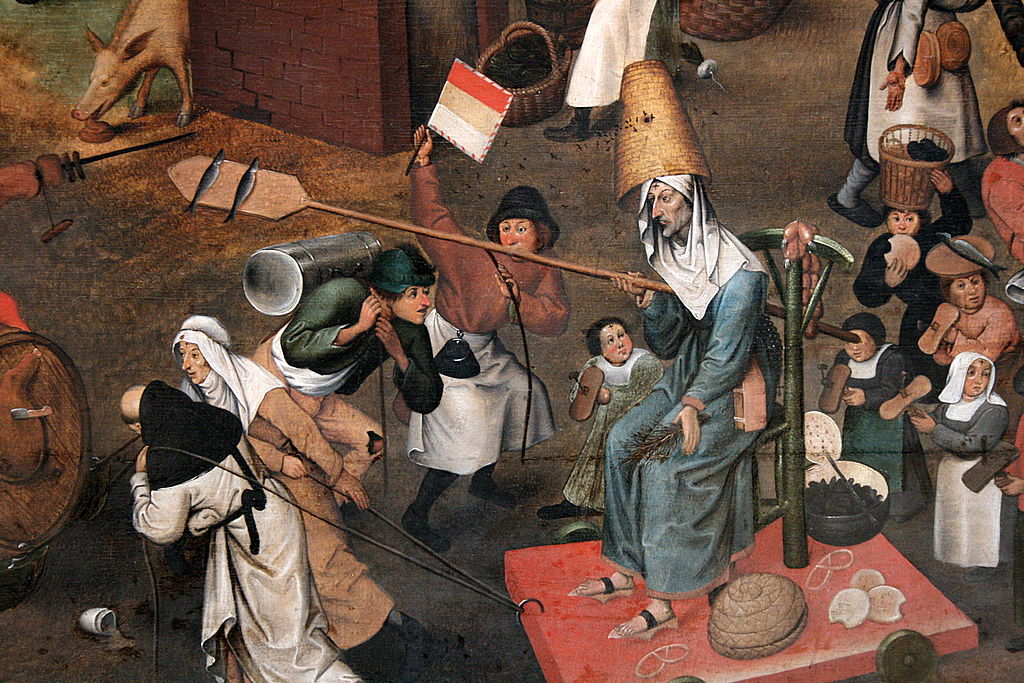Retox / Detox, or: Standing up for lent. A historical ramble
This new year, as every January, a good many people decided to lay of alcohol for a few weeks and cleanse their bodies of its joyful, but unhealthy effects. But this time, the numerous "detox"-tweets were countered by, a spirited innovation, those advocating a rigorous programme of "retox". As it happens, the authors of this blog are also divided on this topic: One Wine Rambler will have nothing of it, while the second is writing these very words with a cup of peppermint tea before him.

That alone is nothing to write home about, after all, we differ on all kinds of things, wine or non-wine. But it did give me the idea for what follows, namely the attempt to probe the subject a little more deeply than the tweet and counter-tweet format allows for. Read on for some thoughts on lent, puritanism and the boredom of plenty.
First of all, I'll admit right away that the word detox is truly idiotic. Not only is it pseudo-scientific and bogus in suggesting there is a toxic residue in your body that can actively be cleansed. I also resent the hint of self-recrimination and narcissistic guilt that invariably creeps into this phrase, like so many people checking into the Betty Ford clinic.
If the concept is so flawed, how, then, am I going to defend the practice (my own, no less)? The only way I can, with a long-winded historical ramble. I'd like to argue that it actually enhances the joy of wine, and that it stems from very old tradition that can still be redefined and made to work.
Before 1750 (or up to 1850, depending on the exact place), Europeans hardly ever ate and drank normally, it seems they either feasted or fasted. The reigning food and drink culture was precarious and austere, but also exuberant and hedonistic. Here's how a leading historian of popular culture, Peter Burke, describes it:
In traditional European culture, the most important setting was that of the festival: family festivals, like weddings; community festivals, like the fest of a patron saint of a town or parish [...], annual festivals involving most Europeans, like Easter, Mayday, Midsummer, The Twelve Days of Christmas, New Year, and the Epiphany; and finally, Carnival. These were special occasions where people stopped work and ate, drank and spent whatever they had. [...] It was opposed to the every day, a time of waste, precisely because the everyday was a time of careful saving.(*)
A divinely sanctioned routine of gluttony followed by lean times, Carnival and lent. How, then, did we leave this behind? By following the advice of a bunch of sour grapes that, in the long run, brought us sobriety, industrialisation and prosperity. Here's Peter Burke again:
The ethic of the reformers was one of decency, diligence, gravity, modesty, orderliness, prudence, reason, self-control, sobriety, and thrift [...] (**)

Today, let's face it, we have made our daily lives a never-ending festival, and the puritan and spoilsports have nothing on us, because we have, at the same time, organised our economy as effectively, and with such material plenty as would frighten the wits out of all of them. It's probably fair to say that most people, myself included, want neither poverty interrupted by bursts of orgiastic gluttony, nor constant puritan self-control. I would argue, however, that there is a psychological dynamic in the older model that many people are, rightly, trying to recreate in their own personal lent, which has just been moved from its original timing to January: You've had rather too much, you're going to have rather too much again, so best lay off for some time in between. Let them call it detox, but it's a much older and arguably wiser thing.
The half-starved peasants of hundreds of years ago actually foresaw our current state of things, except they thought of it as a fantasy: A place where you could eat and drink to you heart's content, all the time. Here is Peter Burke one last time:
A topsy-turvy world was involved in the popular utopia of the Land of Cockaigne, 'Lubberland' or 'the land of Prester John', where houses were thatched with pancakes, brooks ran with milk, there were roast pigs running about with knives conveniently stuck in their backs [...]. (***)
If this sounds weird and strangely unappealing to us today, it's because it is. To be perfectly honest, even so great and varied a thing as wine can get boring. Been there, had that. But there is a historically tried and tested regime of deferred gratification, a secularized and pain-free lent for everyone to impose on themselves: After a few dry weeks, it's like falling in love with wine all over again.
(*) Peter Burke, Popular Culture in Early Modern Europe, third edition, 1999, p. 255.
(**) p. 296.
(***) p. 269.

perhaps one should add that -
perhaps one should add that - at least in the cities - people, even the poorer ones, hardly ever drank water but wine or beer/ale (as far as I know). Of course, the reason for that habit was not the refusal to fast, but the quality of water (the consequences you can see today: after catastrophes like earthquakes in the 2nd or 3rd world, cholera is sure to follow).
I guess this could be one more argument for drinking wine, as the alcohol kills at least some viruses - in some way also a kind of detox...
In reply to perhaps one should add that - by Benita
Good point. It's probably
Good point. It's probably salutary to imagine what the good people from the past would make of our own rapidly changing views of what constitutes a 'healthy' lifestyle.
Moderation
As Julian said, I am not a believer in giving up on wine in January, or any other time of the year, for that matter. Raised a Catholic, attracted to Protestant ethics but not that terribly religious I won't refer to the bible or any other document for this, and as a friend of Nietzsches writings on history I am also not quoting tradition as I believe tradition should be broken if you want to create something better.
What I aim for, in a rather boring way, is to never drink more than I enjoy and only to drink when I enjoy. The latter can be difficult socially (especially when like me you go to a lot of conferences and functions where agonisingly annoying Sauvignon Blanc or dramatically dull Pinot Grigio is served), but overall I am doing okay - even to a point where I sometimes don't drink any alcohol, shock and horror!, for four or five days before my wine rambler duty catches up with me again.
So basically, I feel no need not to drink in January, and the concept of "detox" is about as useful, as Julian noted, as the similarly stupid term "entschlacken" that was invented in German marketing a while ago (it means to consume whichever product happens to be advertised under that term in order to get some mysterious residue ("Schlacke" means "slag", "cinder" or "scoria") out of your body). And to me drinking some good wine over Christmas should, if anything, be a reason to drink some good wine in January too!